After Kherson was liberated the Russian occupiers have been shelling the city on a daily basis. Their artillery is targeting civilian infrastructure, the population is suffering including children too. Everyday people learn from the news that someone has been killed or wounded. In her reportage Natalia Nagorna is telling a story of how people survive their ‘ordinary’ lives in Kherson.
It’s a city that changes every day. Passing through its streets today you cannot even imagine what will happen to these people and houses tomorrow. In the year that passed they survived occupation, liberation from the occupation, then a short quiet period, more shelling and then an ecological disaster after the Russians blew the Khavoka hydroelectric power plant, then came new bombings with a brand new type of weapons. Every new day brings at least a few new casualties in the city and its outskirts, their number varies every time and may count in dozens. In the meantime people return to the city - nevermind the chaotic fire at all residential areas.
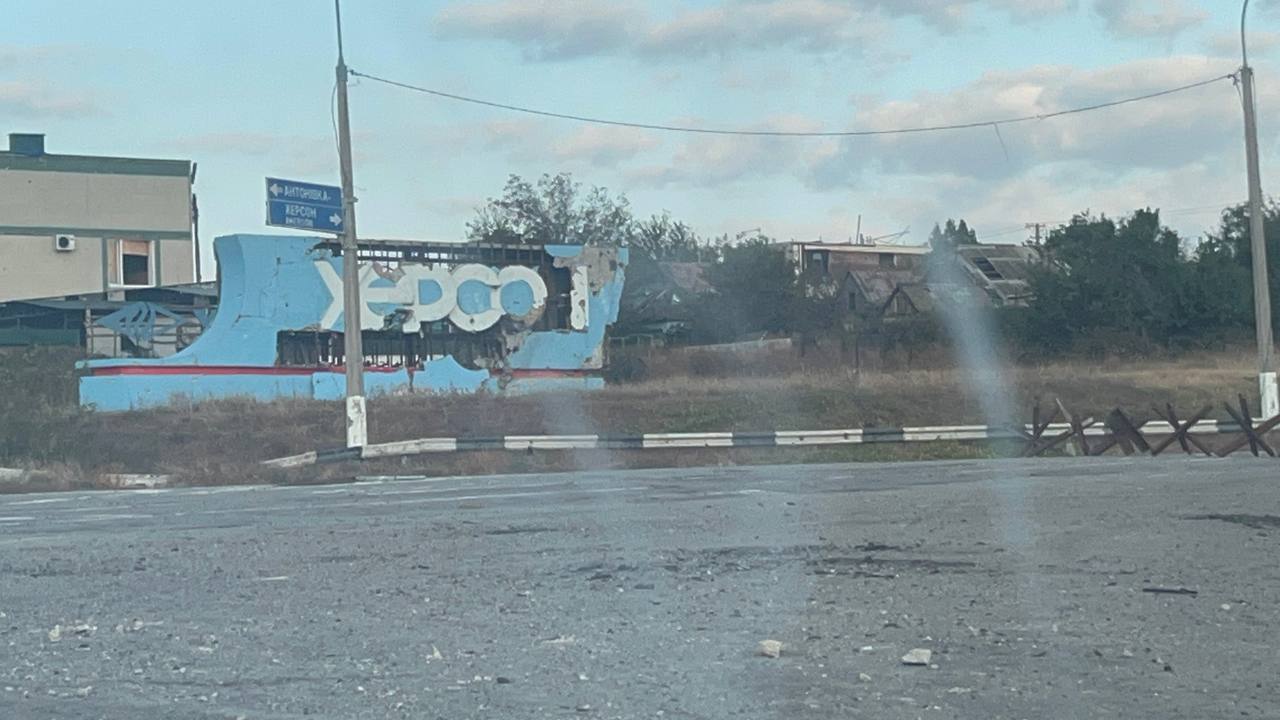
CLOSED DISTRICTS
Journalists, however, can only tell about certain parts of Kherson. At any checkpoint civilians from any part of the country will be easily and quickly allowed to go. Unless they are journalists. Mass media representatives are only welcome into the city accompanied by a press officer and having a special permit. Sometimes entry into the entire city is prohibited. But the areas adjacent to the Dnipro River are closed at all times. The mighty river has divided the city into two parts - the (temporarily, as they insist) occupied one and the one controlled by Ukraine. The river divides and becomes an obstacle.
This part should have included an interview with a Ukrainian military, but access to soldiers has recently been totally denied. One day it will be a history of a new type of battles - of river forcing, battles on empty islands, encounters in reedbeds, featuring how difficult it is to attack on a river cutter. But thus far this piece of history remains dim - the history of combats on land and water. One day Ukrainian soldiers will, for sure, tell everybody how the river prevented the Russians from counterattacking Kherson, at the same time not allowing the Ukrainian army to move forward. At the beginning of the full-scale invasion the Russian managed to march on the Antonivka Road Bridge, but it’s been nearly a year now that it stands completely destroyed.
A NIGHT IN A BUNKER
We have managed to go to the outskirts of Kherson together with volunteers of an organisation called "GEM". They have armoured buses with capsules, which can be used to evacuate children and worry less because of shelling. We have to start as early as we can, so we stay overnight in a bunker. It is for the locals, but they go down there only when the shelling gets extremely powerful. On the night we are there, the bunker is nearly empty. Pavlo is the host - he shows us how he made a blue-yellow flag from a garland. He makes us coffee and helps choose a bed – they are two-story beds. There is electricity in the bunker, so Pavlo puts the kettle on and makes coffee. He announces that Wi-Fi is working, we can chose between two Internet sources, no password. There is a plasma hanging in a deep bunker (it's actually a bunker, not a basement), you can turn on a show, make the sound louder, and not hear the bombs coming.
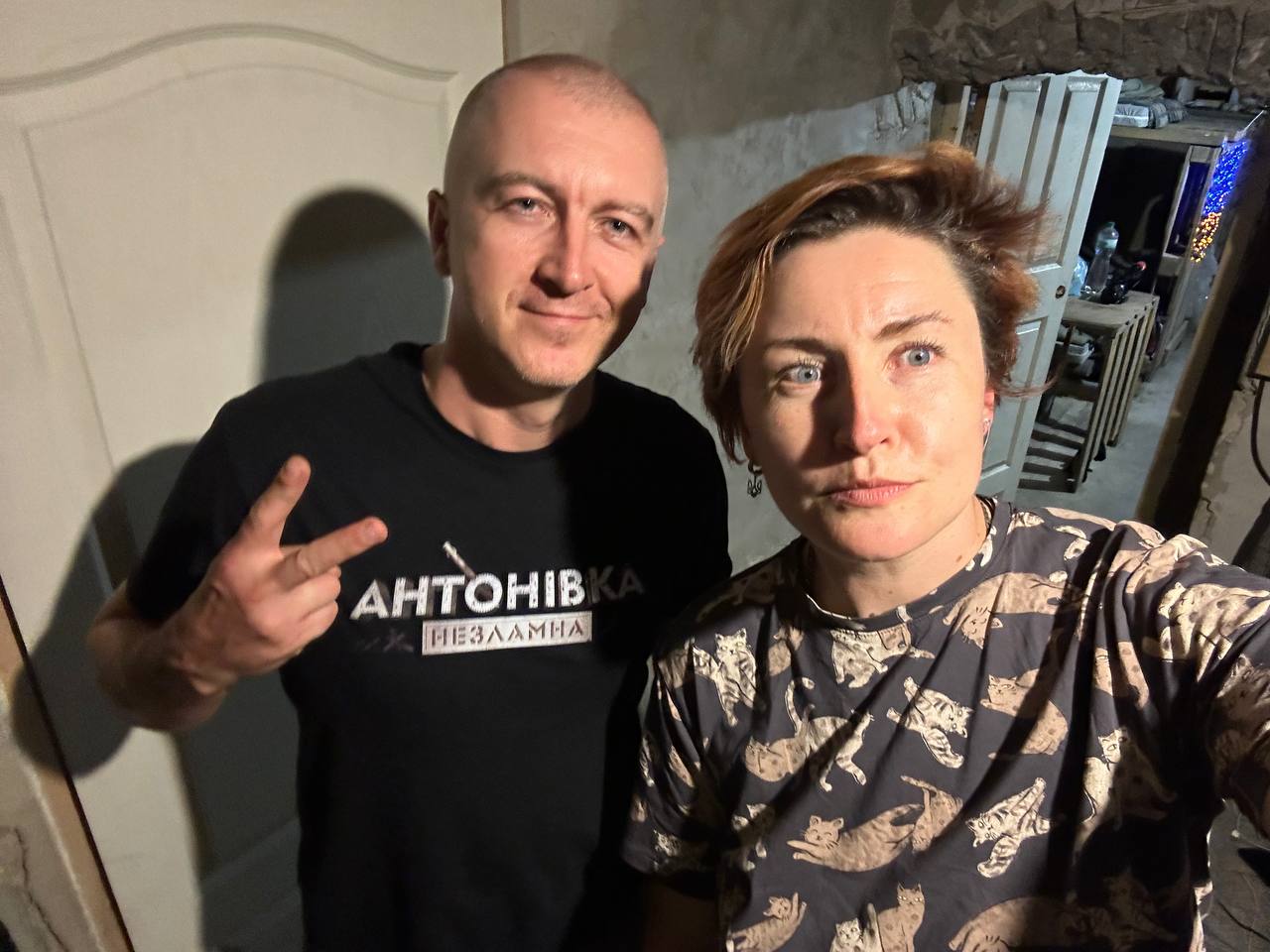
"Yesterday, there were mortars, Pion shells and a KAB (human guided munition) fell”, - Pavlo explains the situation in the district. His friend died when an aerial bomb fell – the man was helping locals repair their car. I saw the dead friend’s photo in the reports. When his body was pulled out from under the rubble, the neighbours begged the medics to save him, hoping he was alive. The doctors declared him dead. The man’s dog lay next to the body and refused to leave.
Two women come to the bunker for the night. My bedmate refuses to give an interview, but she couldn’t help bragging that her granddaughter had just got married. She only worries that the granddaughter’s husband is in the military, and it is difficult to be the wife of a military man during the war.
Maria Vasylivna is talking to me – she spends the day in the garden, doing house work, and is afraid of shelling. At night, she lets herself take a break and goes to the shelter.
"I am afraid to stay on my own: the gunfire is so heavy, I run around my room, thinking what if they hit the house, while I'm in, I will not be able to save myself, here I will at least have a good night’s rest. I can have some good sleep without having to think about anything. I fall asleep in someone else's bed and sleep peacefully all night”.
NEAR THE BRIDGE
At 7 in the morning I am having a fresh cup of coffee Pavlo has made for me. Serhii takes me further on, the local warden. He has an armoured vehicle and he wants to show me Antonivka - a village in the outskirts of Kherson, on the bank of the Dnipro River. He knows the right addresses and he can help evacuate children.
“Some may think 150 children is not a lot. But I believe it is awfully dangerous for children to live in a district where 5 to 10 houses are destroyed in airstrikes every day. But some parents just don’t realise how bad it is for their children, children should not take this kind of risks”, - he says.
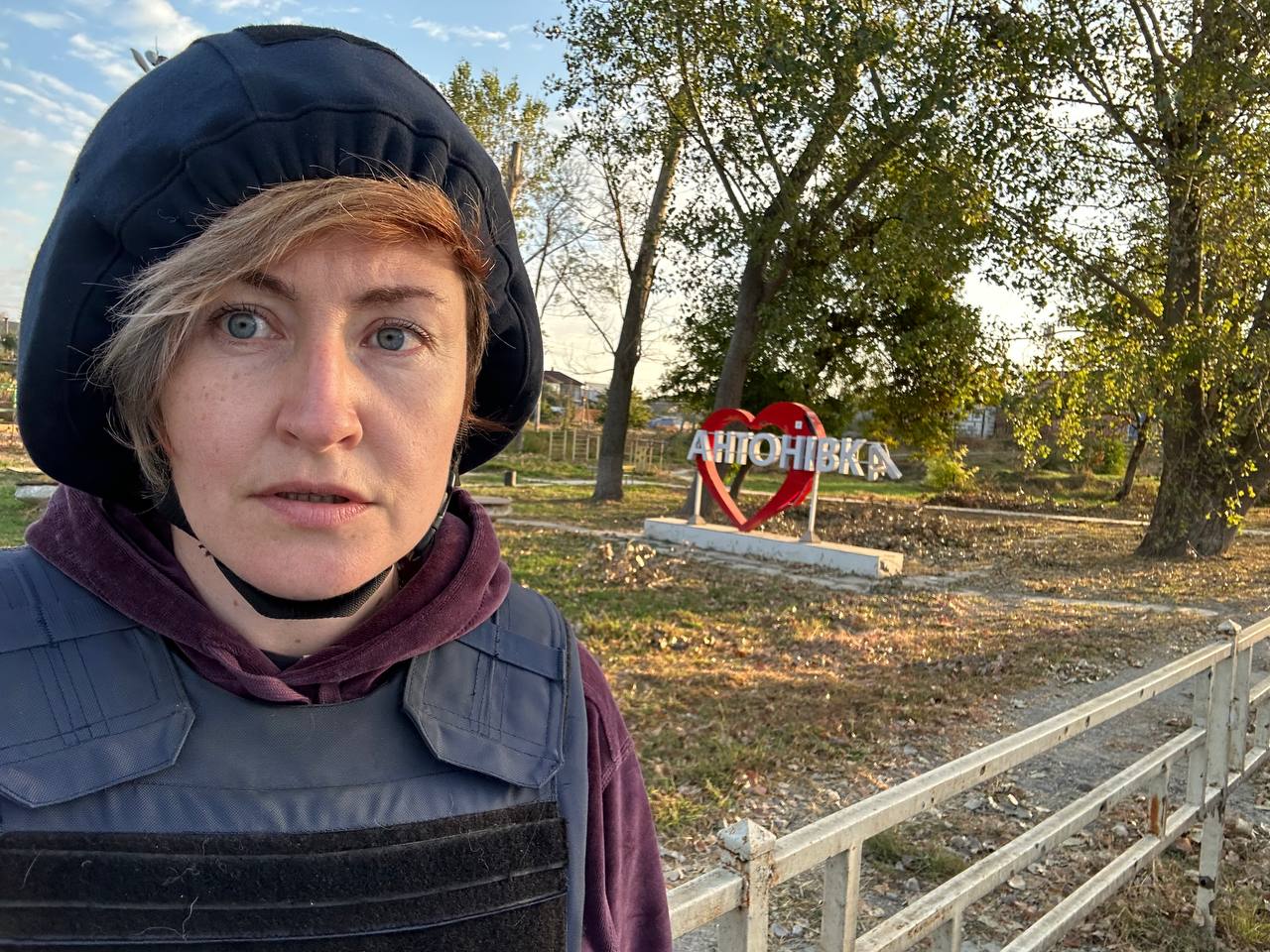
We are moving through the village along its streets that were flooded in the summer. A bunch of local residents gathered around a car – they can have some instant coffee there.
- Is it a car shop?
- Coffee Time.
- Do you make coffee?
- Coffee, water, bread - we need to have some kind of entertainment.
- Do you drink coffee at home?
- Give us the electricity back, we will be having coffee at home, - the man smiles holding a plastic cup in his hands.
There is no electricity in the village, so the car shop doesn’t supply the badly needed meat or sausage. They would even have enough money to buy it - women on a bench near-by are waiting to get their pension. The oldest one, Vira, is 89. The women are joking they are soon going to celebrate a big anniversary in the village. The village itself is completely destroyed, some houses though are intact, while the villagers are only trying to patch the half-destroyed one, useless to repair them properly - what if they get hit again tomorrow?
On the edge of the village there are two armoured buses ready to evacuate the children. Volunteer Serhii, whom everyone calls the Lucky One in the village (he got his nickname after he had managed to escape from Debaltseve despite heavy shelling). The volunteer comes from Volnovakha and his hometown has completely been destroyed. He cannot predict how many children can go after all and how many parents will change their minds in the end.
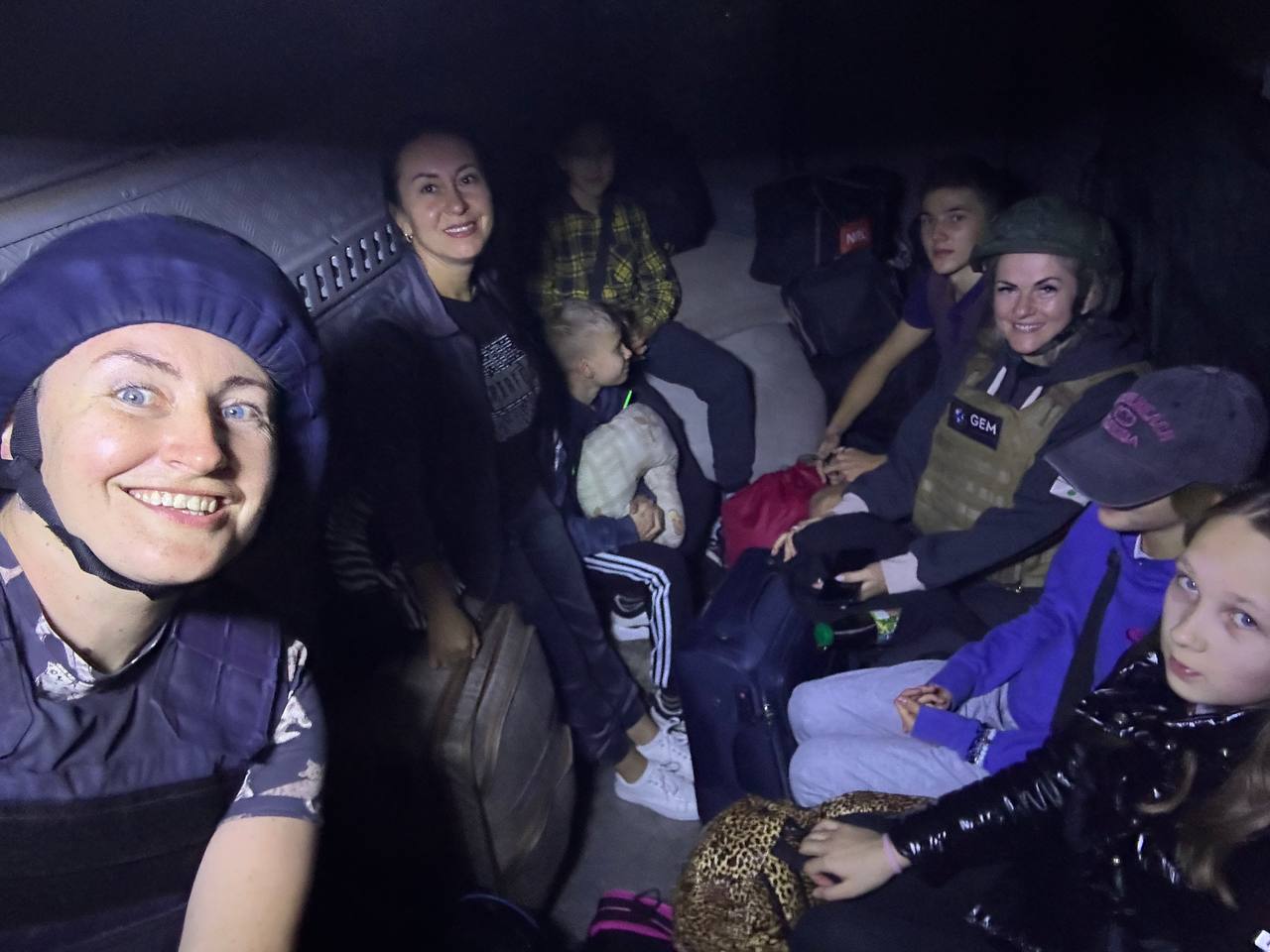
“If we don’t take the children out, for whose sake are we doing all this then? When there is at least one child, we, the adults, need to stand up - whether we are 10, 20, 30 adults, and we need to take this kid out, but here there are a lot of children”, that’s how he explains his trip in the district.
We are speaking to the sounds of shelling and we worry if we can make it and if the kids are ok on the way out.
“If there was no shelling during the night, people would refuse to go in the morning. They lose the sense of danger and they want to stay at home. You can and cannot understand it at the same time because how can you stay if you have children”, The Lucky One says.
For them it is a family trip, tucked up in her body armour Serhii’s wife is right beside him, his nephew also called Serhii is riding the car.
13-year-old Denis is the first one to get on the bus, his mother is crying and kissing him.
“Let my kid go have some rest, all the more so the shelling has become so heavy. Come here, my son, I will give you a kiss”, - it is unclear whether she wants to persuade us or her own self.
When 7 children are loaded into the armoured capsule it starts shaking from their jokes and laughter - they are going on holiday to the Caroathans they can stop being afraid of shelling and they can have a good time. Everything is ready for them at a resort complex in Yaremche. They children are given a marker pen each and are allowed to write something on the walls for those who come after them. They write the name of their native Antonivka and draw hearts around it, there are childrens’ names on the walls too. Denis writes in big letters:
“WE WILL COME BACK”.
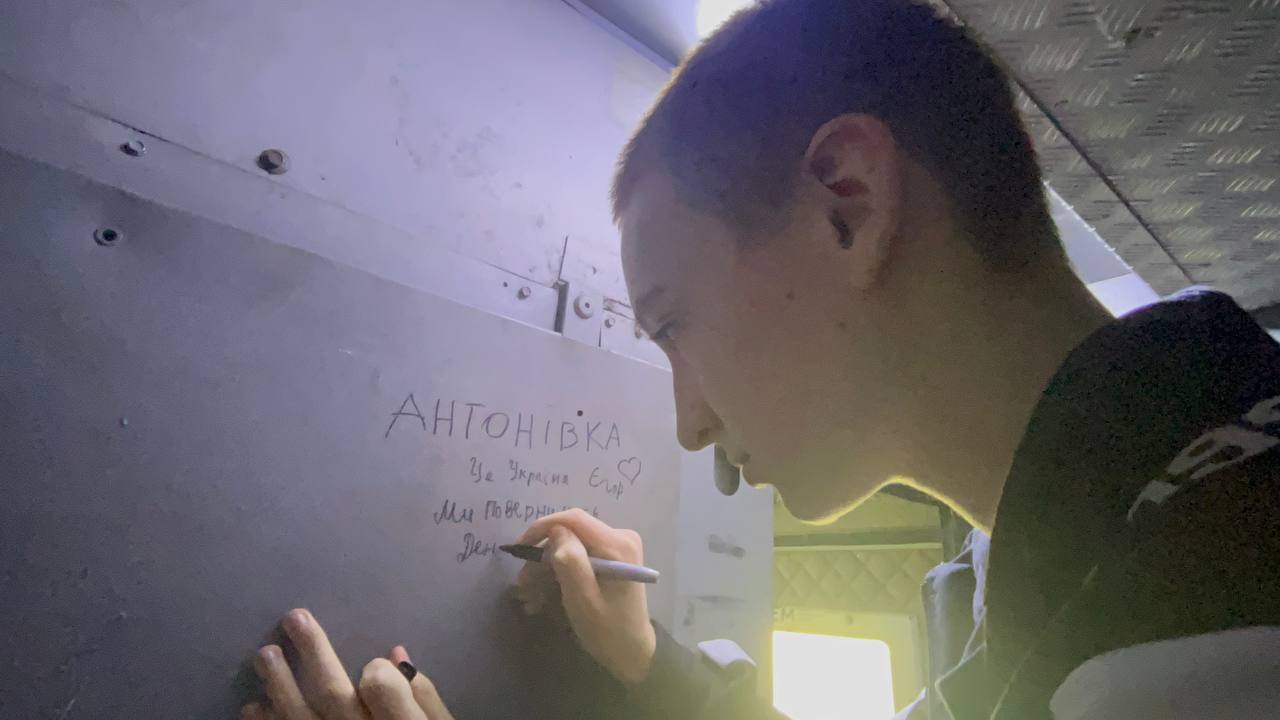
Another group of children arrives from the Village of Komyshany, from there the children are evacuated with a regular bus, no armour, because the place is considered to be safer. A girl whose name is Angela says she is going together with her two brothers and they will be going to school. They haven’t had such an opportunity for three years now. “They hit my school twice”, she explains.
A total of 28 were saved during this evacuation. The youngest was 18 months old. 9 adults go with them. But the majority of parents stay behind to look after their farms. The absolute majority have their children staying with them. A few days after that evacuation tour the village of Komyshany was under shelling and a 9-year-old girl was delivered to hospital in a coma. While the doctors were trying to save her life the reports only read one line: ‘she is in bad condition’.
CHILDREN OF KHERSON
According to the officials, there are some 72 thousand people living in Kherson, and more people keep coming back. Before the full-scale war there were three times as many residents. Among those who live in Kherson today 5,5 thousand are children. The schools are destroyed and no one leaves their kids in kindergartens. Children learn online and have practically no chance of a normal life. Shelling can start without any alert. Russian artillery can hit any part of the city, airstrikes are becoming even more frequent every day. Kids can only be protected in the only possible way – they need to be evacuated from the combat zone.
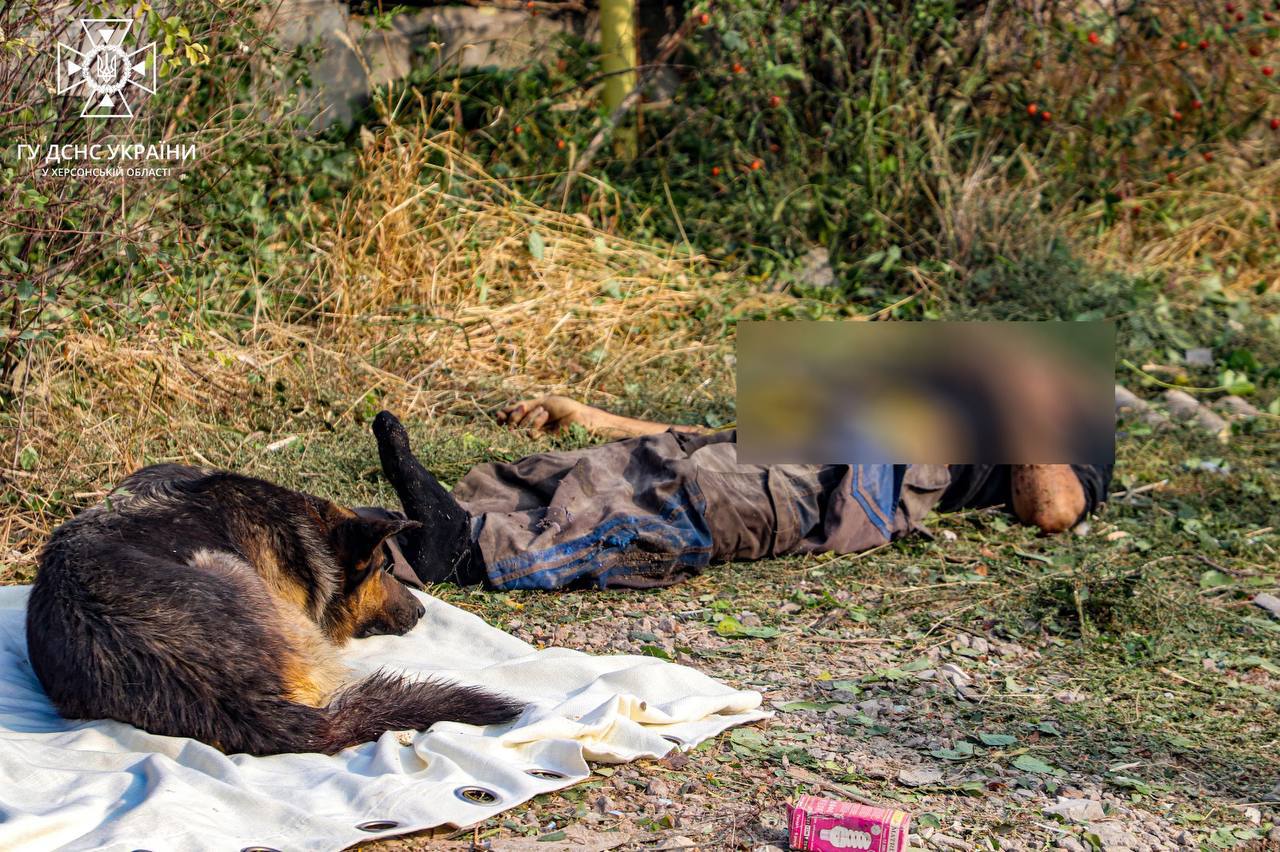
We arrive at a place where a multi-apartment building has been hit - a nine-year-old girl and her mom have been wounded overnight. We have been looking for the child but have ended up not getting any information. But we immediately spotted their apartment. It is on the third floor, something is falling down off the spot where there used to be a balcony. A piece of a tree trunk is sticking out under the shattered windows – it used to be a big tree, its branches slightly covering the windows caught all the fragments of shells.
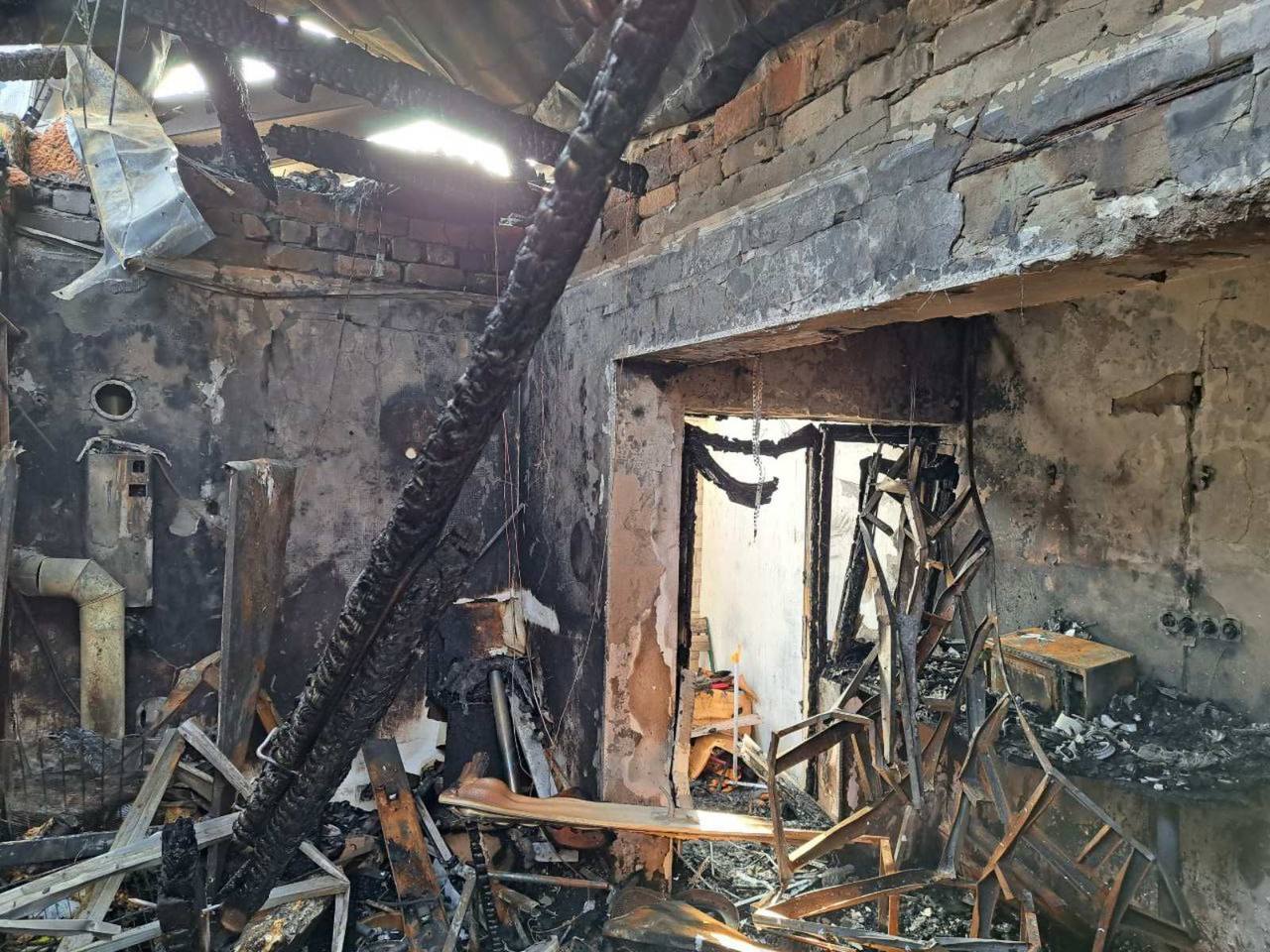
One of the first people we can see there is the six-year-old Zlata. The girl is helping out the adults. Three shells hit the building she lives in, but luckily her apartment is intact.
“I am working”, Zlata explains to me while pouring out a spade-full of broken glass into a trash container. The spade is taller than Zlata. There is no particular need for children to participate in the clean-up. There are plenty of grown-ups in the court-yard, they all have brooms and spades - they are sweeping the ground and cleaning the debris. This is kind of a game for a child, she is together with adults and she is attended to. Can a shell hit this spot at any moment now? Yes. But the broken glass has to be cleaned away. In a couple of days Zlata’s mother decides to take her daughter to Lviv to stay with some relatives.
Near a burnt down car we meet 8-year-old Daria - the girl is here with her mom Anastasia. They have come to see how their car has burnt to ashes. The car was running on cas that’s why other cars around also caught fire.
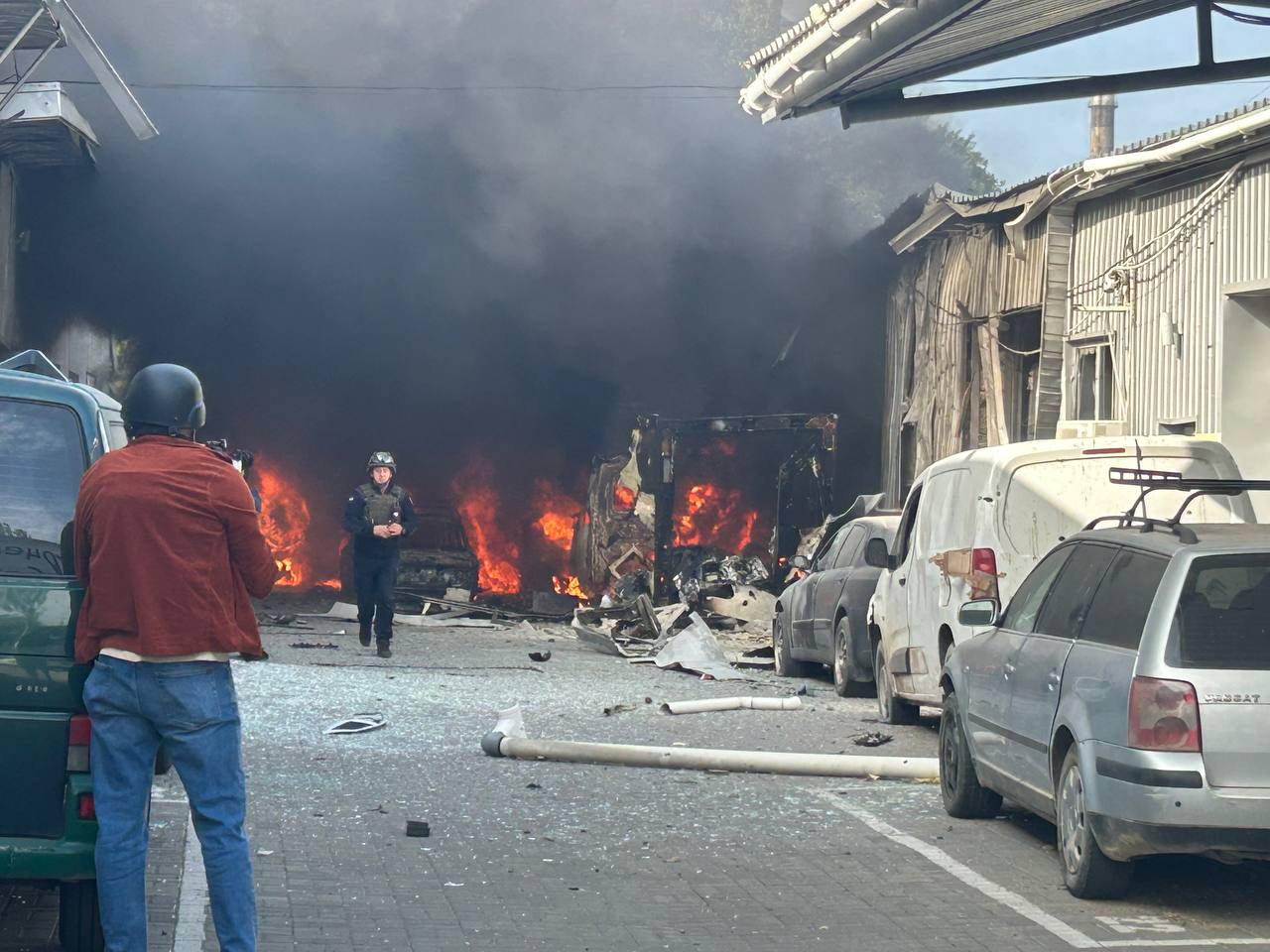
“I was asleep and mom took me out into the corridor”, - the girl recalls the night’s events. Her mom explains that they have nowhere to go and have no money. We reach out to the volunteers and the mom agrees to leave, but the following night it is a lot calmer in their district and the family changes their mind to move out again.
Then we meet a man wearing football apparel. He says he is coming back from training - today he managed to have a work out but the other day he had to run away from the stadium - the Russians were firing heavily. He is telling us a married couple stayed at his place last night - Dmytro, Diana and their daughter Emilia. This is the family that was reported wounded. It turns out they went back to their place to collect some of their belongings.
We meet Diana right in front of the building, she is holding her daughter. Emilia is smiling, she has big blue eyes. The neighbours come to say hello to her. Everyone knows and loves this family here.
They are displaced left-bankers and this is the second time their place gets hit. They chose carefully an area where their daughter is safer. But overnight they ended up covering their child with their own bodies and a duvet, though the top of the girl’s head still has burn marks.
Diana tells us: a fragment stuck to her nighty, the girl’s father is a bit lame 0 a fragment hit his leg. “I wanted my baby to be born in a free Kherson and it happened”, - Diana is smiling.
This family is one of few who immediately agree to go. The only thing the parents worry about now – if there is a shelter not far from where they are going to live now and also if Dmytro can find a job. It is important for them to stay independent and protect their Emilia.